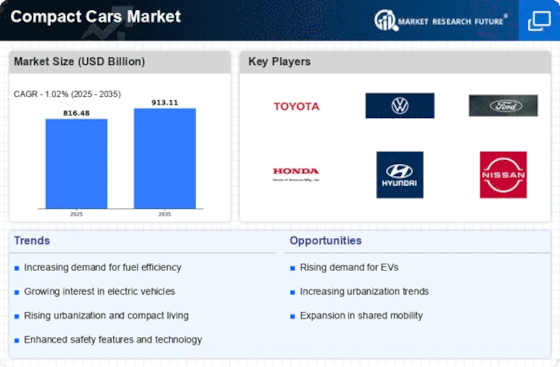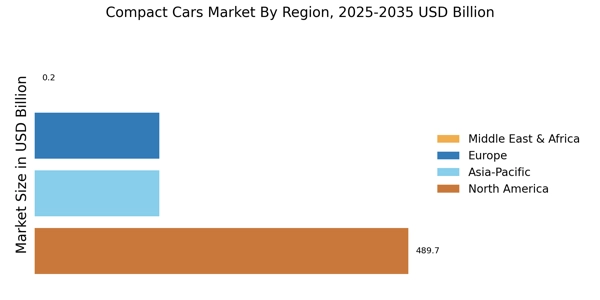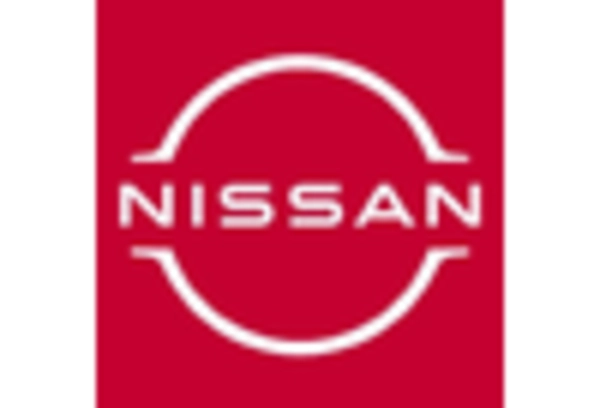Urbanization and Compact Living
The Compact Cars Market is significantly influenced by the ongoing trend of urbanization. As more individuals migrate to urban areas, the demand for compact vehicles that can navigate congested city streets is increasing. In densely populated regions, parking space is often limited, making compact cars an attractive option for urban dwellers. Data indicates that urban areas are expected to house over 60% of the global population by 2030, further driving the need for smaller, more maneuverable vehicles. This urban-centric lifestyle encourages manufacturers to focus on producing compact cars that offer practicality and efficiency, thereby enhancing their appeal in the Compact Cars Market.
Rising Fuel Efficiency Standards
The Compact Cars Market is experiencing a notable shift due to the increasing fuel efficiency standards imposed by various governments. These regulations aim to reduce carbon emissions and promote sustainable driving practices. As a result, manufacturers are compelled to innovate and enhance the fuel efficiency of their compact vehicles. In 2025, the average fuel economy for new cars is projected to reach approximately 40 miles per gallon, which is a significant improvement compared to previous years. This trend not only aligns with environmental goals but also appeals to cost-conscious consumers who seek to minimize fuel expenses. Consequently, the Compact Cars Market is likely to witness a surge in demand for vehicles that meet or exceed these stringent standards.
Affordability and Economic Factors
Affordability remains a crucial driver in the Compact Cars Market. With rising living costs and economic uncertainties, consumers are increasingly seeking budget-friendly vehicle options. Compact cars typically offer a lower price point compared to larger vehicles, making them an appealing choice for first-time buyers and those looking to downsize. In 2025, the average price of a new compact car is projected to be around 20,000, which is competitive in the current market landscape. This affordability factor, combined with the rising costs of fuel and insurance, positions compact cars as a practical solution for many consumers. Consequently, the Compact Cars Market is expected to thrive as more individuals opt for economical vehicle choices.
Technological Advancements in Safety Features
The Compact Cars Market is witnessing a surge in the integration of advanced safety technologies. Consumers are increasingly prioritizing safety features when selecting vehicles, prompting manufacturers to innovate. Technologies such as automatic emergency braking, lane departure warning, and adaptive cruise control are becoming standard in many compact models. In 2025, it is estimated that nearly 70% of new compact cars will be equipped with these advanced safety systems. This trend not only enhances consumer confidence but also aligns with regulatory pressures for improved vehicle safety. As a result, the Compact Cars Market is likely to see a rise in sales of models that incorporate these cutting-edge safety features.
Environmental Awareness and Eco-Friendly Options
The Compact Cars Market is increasingly shaped by heightened environmental awareness among consumers. As individuals become more conscious of their carbon footprint, there is a growing demand for eco-friendly vehicles. Compact cars, often designed with fuel efficiency and lower emissions in mind, are well-positioned to meet this demand. In 2025, it is anticipated that sales of hybrid and electric compact cars will account for approximately 25% of the total compact car sales. This shift towards greener alternatives not only reflects consumer preferences but also aligns with governmental initiatives aimed at promoting sustainable transportation. Thus, the Compact Cars Market is likely to benefit from this trend as manufacturers expand their eco-friendly offerings.

















